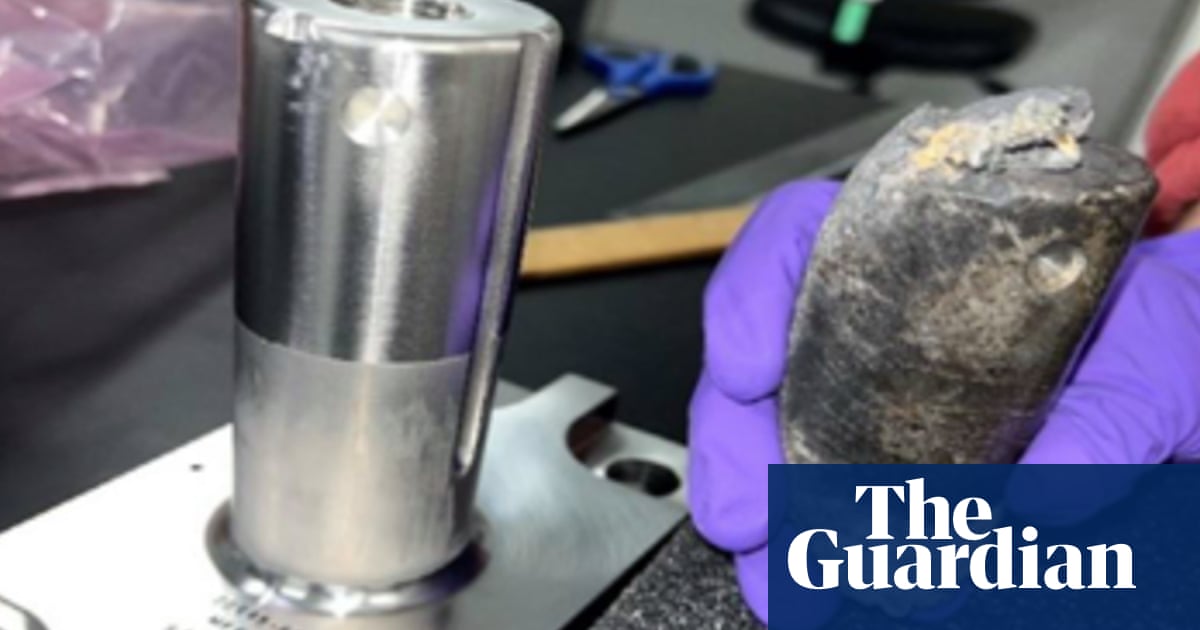A family in Naples, Florida, whose home was struck by debris that fell to Earth from outer space and punched a hole in the roof is pursuing $80,000 from Nasa in compensation for damages.
The law firm Cranfill Sumner said in a press release that it filed a claim on behalf of plaintiff Alejandro Otero and his family.
A metallic cylinder slab from a cargo pallet that had been released by the International Space Station in 2021 hit the Otero family home on 8 March 2024 while their son Daniel was home. No one was injured, though it created a hole in the roof and floor.
Otero told Wink News that the object almost hit his son, who was two rooms over.
The US space agency later confirmed the debris was from its flight support equipment. A section of the debris remained intact rather than disintegrating after it entered Earth’s atmosphere before falling to the surface.
80,000 seem like a reasonable amount.
That was my thought as well. Seems like a reasonable amount to cover repairs and some extra without being excessive.
New roof and floor. Plus whatever other damage to the room, plus a bit of buffer for legal fees.
Surprised that they having to go to court. Like “we pay your repair bills, some for the lawyer. Everyone wins.”
Might be required for whatever insurance process NASA has to follow.
Policy requirements like that are why you see scenarios where people are suing family members when the issue is clearly covered by insurance.
Federal government agencies rarely have insurance for things like these. The federal government is self-insured.
I’d be asking for more — emotional distress, rent to live somewhere else while they fixed my house for months, additional money for the inconvenience.
You overestimate the worth of your inconvenience.
I very much don’t. My time is valuable.
I hate frivolous lawsuits as much as anyone, but this seems very reasonable. Fix my stuff and let me keep the piece and we’re cool.
I thought the same thing. This doesn’t seem frivolous at all. They’re not claiming that they’re living in constant fear of the sky falling.
And I’m with ya, I’d totally want to keep the debris.
Yeah some people would bubble this lawsuit as like “we’re seeking millions in psychological damages” but 80k is what I would expect for home repair and a little “you almost killed our kid”
Anything that survives deorbit might be slightly radioactive so they can have it back, if it were me.
The fact that you even thought frivolous lawsuit when reading the headline is a sign that McDonald’s campaign to vilifying suing worked.
That’s quite the reach. It certainly could have been the McDonald’s propaganda of whose details I was fully aware, but it was more likely the “My Mac and cheese took too long to cook” suit, the “Texas Pete isn’t even made in Texas” suit, the infamous “$54 million because my dry cleaner lost my pants” suit, or any of a litigious litany of loonies trying to sue for exorbitant sums of money over minor inconveniences.
Space junk comes through your roof and you want the damages repaired? Cool. McDonald’s not included.
That’s hardly even a story - house repairs cost a lot of money, and NASA’s equipment (by their own admission) caused the damage.
It’s only the police that get away with ruining people’s things without paying.
yeah whats newsworthy to me is the low value. Is the guy doing the work himself?
$80,000 seems more than reasonable to fix a roof and floor imo.
Guessing the ceiling took a hit as well
Space debris hitting a house is newsworthy in and of itself. It’s rare and fascinating.
yeah that story was like a week before.though. maybe longer as I first saw it on broadcast news. this is a followup.
Ahhh, I didn’t see it before.
I dunno, if a car kicks up a rock from the road and smashes a windscreen, that’s considered no one’s fault. Even though the car in front kicked it up.
In this case, NASA have assumed that things would burn up in re-entry, based on past experience and modelling. For some reason that didn’t happen here. However, that might not be enough to prove liability - if NASA is considered to already make reasonable efforts to prevent this.
A rock falling from a truck’s load on the highway however is the fault of the truck owner, regardless of whatever bumper sticker they want to put saying otherwise. Trucks are required to properly secure their loads.
This isn’t random space debris that existed and entered the atmosphere without NASA involvement.
Indeed, the difference between the two is that a driver has no responsibility for any debris already present on the road that they inadvertently caused to damage something. They are however responsible for damage caused by any object they themselves introduced to the roadway.
The NASA equivalent would be pretty straightforward, they are not responsible for any space rocks that they accidentally disturbed from orbit and caused to land on your house, but they are fully responsible if thier own craft or parts thereof fell from space onto your house.
Probably just suing so that insurance covers it.
Just a matter of time before they add a higher deductible specifically for space junk. 😒
Imagine if space shit killed your dog
Fuck right off, my life sucks enough. My precious little dog is my one ray of sunshine in my life, he’s always happy to see me and never fails to bring a smile to my face. Dogs are just the best, idk how anyone could possibly not like them, it just doesn’t compute for me.
Yeah I love dogs too
Dogs are the best, I’ll never understand how people can dislike them.
People who have been mauled by dogs get a pass in my book
Yeah that’s completely fair, there are valid reasons for not liking dogs, I’m just being a bit hyperbolic.
I like dogs, but would never own one. To much love, to needy.
I want a cat to resent me for rest of its life cause I smoosh it every day.
Or your parent/guardian
Or in this case, their son, who was home at the time, and just happened to be in a different room
NASA probably doesn’t want to pay this because it would set a precedent that they have to pay for other space debris incidents. The days of counting on debris landing somewhere harmless or burning up in the atmosphere would be over.
Good. It’s a flawed system that did damage to someone’s home and almost killed their kid.









